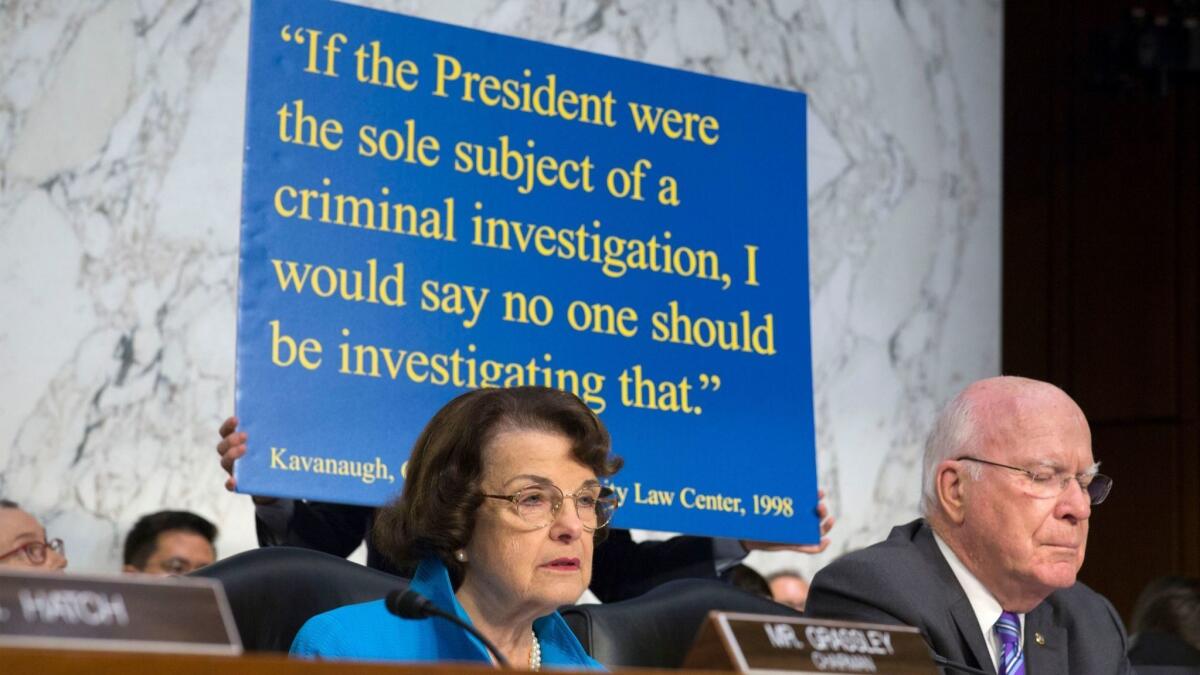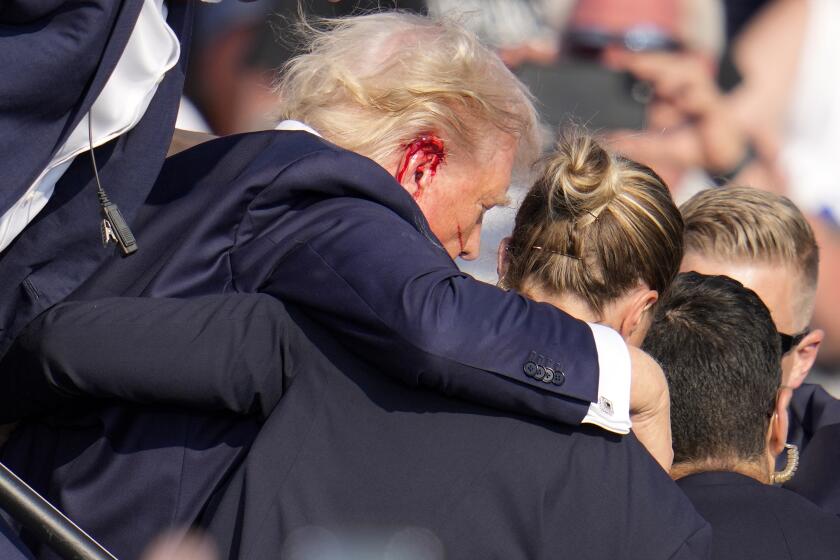Op-Ed: Dianne Feinstein: Why I’m voting ‘no’ on Brett Kavanaugh’s Supreme Court nomination

Democrats on the Senate Judiciary Committee entered the confirmation hearings for the Supreme Court nominee Brett Kavanaugh with concerns about his record and his views. After four days of testimony and questions, those concerns remain — and in some cases have increased considerably.
Setting aside the serious problem that Republicans withheld millions of documents related to Judge Kavanaugh’s years in the George W. Bush White House, our biggest apprehensions have to do with the very real-world implications of putting him on the Supreme Court.
We already knew that Judge Kavanaugh held highly ideological views on the 2nd Amendment, women’s reproductive rights and the executive power of the presidency. Judge Kavanaugh’s testimony shed new light on these positions and on his loyalty to President Trump and his political agenda.
Supreme Court justices should not be an extension of the Republican Party. They must also have unquestionable character and integrity, and serious questions remain about Judge Kavanaugh in this regard, as indicated in information I referred to the FBI. For these and other reasons detailed below, I strongly oppose Judge Kavanaugh’s nomination to the Supreme Court.
Reproductive health
Judge Kavanaugh declined, more than a dozen times, to say that Roe vs. Wade was correctly decided and reiterated that he has no hesitation about using courts to deny women access to reproductive health care, including contraception.
Judge Kavanaugh also declined to distance himself from his dissent in Garza vs. Hargan, the case in which he denied a 17-year-old woman being held in an immigration detention center access to abortion care, even after she had jumped through all of the hoops Texas has in place.
The federal government subjected the young woman to harassment; forced her to go to a pregnancy crisis center, where she received unnecessary ultrasounds and was lectured on others’ religious beliefs; notified her abusive parents about her decision; and improperly interfered with her case before a Texas judge.
When arguing against that young woman’s rights, Judge Kavanaugh not only ignored Supreme Court precedent, he created additional burdens in an effort to delay her ability to end her pregnancy. By stating that his decision in her case did not run afoul of existing precedent, Judge Kavanaugh could not have made clearer his hostility toward Roe vs. Wade and the landmark 1992 ruling Planned Parenthood vs. Casey.
Partisan language
During last week’s hearing and in his past opinions, Judge Kavanaugh repeatedly employed the language of the far right, at times sounding more like a Republican politician than a conservative judge.
For instance, in justifying his extreme record on guns, Judge Kavanaugh adopted the language of the National Rifle Assn. and refused to acknowledge the devastation and havoc caused by guns. Instead, he pivoted to the NRA’s line about the need to “harden” schools. That phrase, code for arming teachers, was used by NRA President Wayne LaPierre two weeks after the Parkland massacre.
Judge Kavanaugh also used ideological language in his dissent in the Garza case, calling the prolonged process Jane Doe went through “abortion on demand.”
Writing about the Hobby Lobby case, Judge Kavanaugh argued that requiring employers to provide contraception coverage to employees imposed a burden on their religious liberty — and ignored completely the burden that is imposed on women when their insurance fails to cover birth control. In testimony last week, Judge Kavanaugh went even further and used an inaccurate and political term for contraception, “abortion-inducing drugs,” yet another ideological phrase that contradicts medical evidence.
Judge Kavanaugh chooses his words carefully, which makes his reliance on extreme political language all the more troubling.
Judicial deference
While Judge Kavanaugh dodged questions about Roe vs. Wade and other issues, he talked extensively with Republicans about overturning the decades-old “Chevron doctrine” governing what courts should do when Congress passes a law with an ambiguous interpretation.
Chevron deference says that a federal court will defer to a federal agency’s views, on the logic that the agency has more expertise. It allows federal agencies to write the rules that protect consumers, clean air and water.
Although Justice John Paul Stevens’ opinion in Chevron has been cited in more than 15,000 judicial decisions, big business has been pushing to overturn it and hamstring the ability of federal agencies to write such rules.
At his hearing, Judge Kavanaugh gave every indication that he would undermine the Chevron doctrine, thereby siding with corporations that pumped money into his nomination fight.
Civil rights
Judge Kavanaugh demonstrated that, if confirmed, he would probably become the fifth vote to overturn the constitutionality of affirmative action plans, even though the Supreme Court has repeatedly upheld them, most recently in 2016 when Justice Kennedy sided with the majority in Fisher vs. Texas.
While in the White House counsel’s office, Judge Kavanaugh advocated for “race neutral” programs that fail to account for race discrimination. In testimony, he would not say that he opposed such programs.
When pressed in the confirmation hearings on his support for voter ID laws, which have a disproportionate effect on low-income and minority voters, Judge Kavanaugh argued that Congress — not the courts — should enforce constitutional rights.
This flies in the face of the role that courts have historically played in protecting against majorities overrunning the rights and liberties of the American public. If the court had adopted this view, it probably would not have desegregated schools in Brown vs. Board of Education.
Misleading statements
Judge Kavanaugh has repeatedly made misleading and at times false statements, in last week’s hearing and in past hearings.
Because of his evident partisanship, Judge Kavanaugh’s nomination to the D.C. Circuit Court of Appeals was highly controversial. Newly released emails from his time in the White House counsel’s office now show that he went to great lengths to mislead senators about his work.
In 2004, Judge Kavanaugh said he had never received information stolen from Democrats by a Republican staffer, Manuel Miranda. However, emails now show that Judge Kavanaugh was in regular contact with Miranda, and that he did, in fact, receive stolen material. Asked about the new evidence, Judge Kavanaugh doubled down, arguing that it was common for the White House to receive information about Democrats’ strategy. This is simply not credible.
Enter the Fray: First takes on the news of the minute from L.A. Times Opinion »
Judge Kavanaugh also downplayed his involvement in pushing two controversial judicial nominees, William Pryor and Charles W. Pickering Sr. Judge Kavanaugh claimed Pryor’s nomination to the 11th Circuit Court of Appeals was not one he had “handled” or “worked on personally,” and also that he had not “primarily handled” Pickering nomination’s to the 5th Circuit Court.
In fact, emails show that Judge Kavanaugh participated in a range of meetings and strategy sessions about both nominees. Judge Kavanaugh was involved in Pryor’s interview process and pitched positive opinion pieces about him to the Washington Post. He also drafted letters and prepared briefing binders for senators in support of Pickering.
Lack of transparency
More than 90% of the documents related to Judge Kavanaugh’s years in the White House have been kept from the Senate and the public. It’s simply impossible to know what else is being hidden or covered up.
Coupled with Judge Kavanaugh’s own tendency to give misleading and false statements, this lack of transparency should motivate senators to oppose his nomination. With so many serious questions outstanding, Judge Kavanaugh should not be rewarded with a lifetime appointment to the Supreme Court.
Sen. Dianne Feinstein, a Democrat, is California’s senior U.S. senator and the ranking member of the Senate Judiciary Committee.
Follow the Opinion section on Twitter @latimesopinion or Facebook
More to Read
A cure for the common opinion
Get thought-provoking perspectives with our weekly newsletter.
You may occasionally receive promotional content from the Los Angeles Times.




